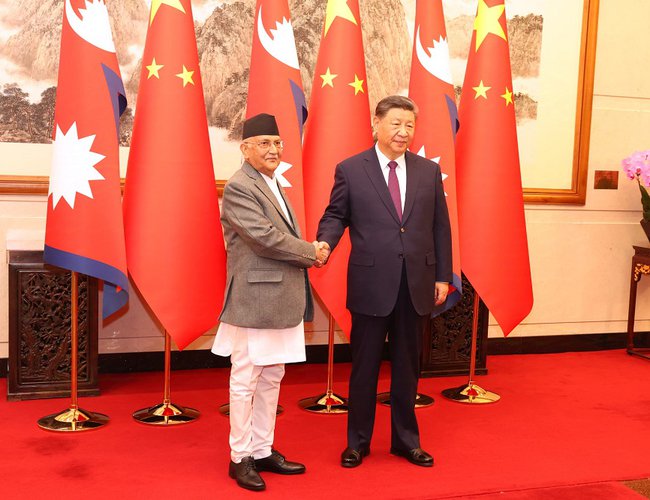
Despite intense debate and differences over the Belt and Road Initiative between two ruling coalition partner Nepali Congress and CPN-UML, it is yet to known what kinds of BRI agreement Prime Minister KP Sharma Oli signed during the visit.
Upon Arrival to Nepal, Prime Minister Oli said during his visit to China that there is no loan agreement with the Chinese government. He answered the questions asked by media persons at Tribhuvan International Airport and clarified that he would not take any loan before his visit to China and clarified that there was no agreement regarding the loan during his visit to China.
He said that according to the agreements made under the BRI, all the funds that Nepal will get are subsidies. He said, "Since yesterday, I have said that we are not going to take any loan, there is no talk about taking a loan, I have been speaking here.
There was no discussion. This time we have talked about various projects under BRI. Under each project, we have separate discussions, separate agreements and how to implement it.
While in Beijing, Prime Minister Oli met with Chinese President Xi Jinping, held bilateral talks and oversaw the signing of various agreements including a framework agreement on Belt and Road Cooperation in the presence of his Chinese counterpart Li.
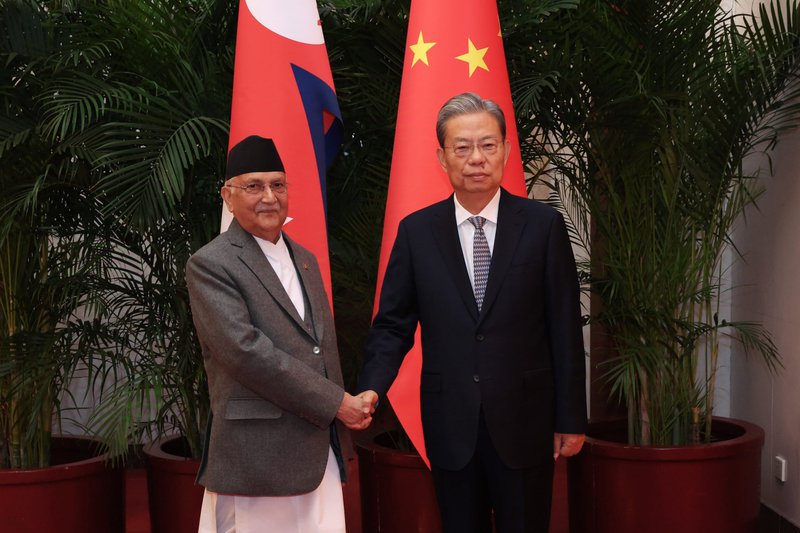
The Prime Minister also delivered a keynote speech under the theme of Comprehensive Democracy: A Journey towards ‘Prosperous Nepal, Happy Nepali’ at a programme organized at Peking University in Beijing. He also addressed the 'Nepal-China Business Summit' on Wednesday.
However, in finalizing the wording of agreements signed during Oli’s Beijing visit, the word “grant” and “aid” became a sticky point with the Nepali delegation communicating between Kathmandu and Beijing when the Chinese side objected to using the word “grant” in the bilateral agreements, according to reports in the media.
Kathmandu signed up for China’s Belt and Road infrastructure initiative in 2017 and says no project has yet been implemented since a framework pact was inked.
A major reason for Oli’s visit to Beijing was to get these projects off the ground with new framework agreements the Nepalis were keen to sign. However, there is reluctance among Nepali politicians particularly Nepali Congress to sign up for Chinese loans.
During their meeting on 3 December, Chinese President Xi Jinping told PM Oli that both countries would aim to strengthen their bilateral relationship through infrastructure projects aided by Chinese money. According to China’s Xinhua news agency, Beijing will deepen its support for infrastructure construction under China’s Belt Road Initiative (BRI).
Ahead of the meeting with Xi, PM Oli met Premier Li Qiang and signed nine deals, according to Nepal’s foreign ministry. They cover Beijing’s support for constructing a tunnel to quicken the journey between Kathmandu and the Chinese border and the reconstruction of an ancient palace in the historic Durbar Square in the Nepali capital. The nine-story palace was damaged in a 2015 earthquake.
China and Nepal signed several BRI-related deals in 2017 and 2019; during the visit Xi to Kathmandu, the relationship was upgraded to a ‘Strategic Partnership of Cooperation’, and China pledged $740 million as development grants.
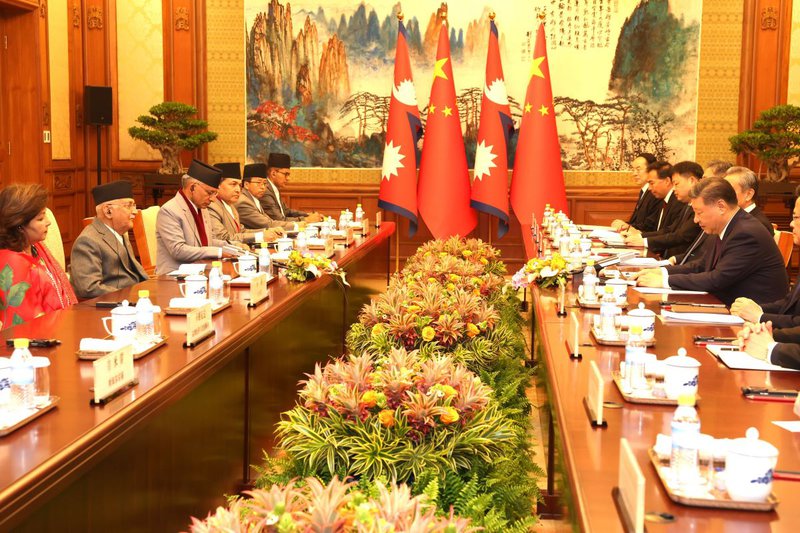
Indian media has been closely monitoring Oli’s Beijing visit, with the Hindustan Times calling him a “pro-China leader” and the Business Times describing him as a “veteran community politician”.
According to India’s Business Standard, a revived BRI framework agreement was signed between the two countries during Oli’s visit. In a joint statement, both sides have expressed their commitment to strengthening connectivity between the two countries in ports, roads, railways, aviation, power grids and telecommunication to help Nepal transform from a land-locked country to a land-linked one. Speaking at a program held at Peking University, Oli later said that Nepal would reap benefits from the BRI.
“New Delhi should not overly interpret the China-Nepal cooperation, which does not target any third party. Instead, the cooperation is conducive to promoting regional common development and safeguarding regional stability,” Hu Zhiyong, a research fellow with the Institute of International Relations at the Shanghai Academy of Social Sciences, told Global Times, adding, “The BRI is a big cake for cooperation. Nepal wants to share the cake as well”.
Minister for Foreign Affairs Dr Arzu Rana Deuba has clarified that the Belt and Road Initiative Framework agreement recently signed between the Government of Nepal and China has not mentioned the issue of obtaining loan anywhere.
Minister Dr Rana said the recent agreement between Nepal and China is being superficially commented upon without a thorough study. "We have signed a cooperation-based project under the BRI which does not mention the issue of taking loan", she said at the Tribhuvan International Airport (TIA) before leaving for the Netherlands to present Nepal's views in international hearing on climate change at the International Court of Justice (ICJ).
She also made it clear that the projects under the BRI agreement would be taken forward only on consent between both the countries. "The decision to take loan will be done on the consent and request from the recipient country. We don't obtain it, if we don't need the loan how does another party force us? Therefore, it is whimsical to say that the government has signed an agreement to take loan".
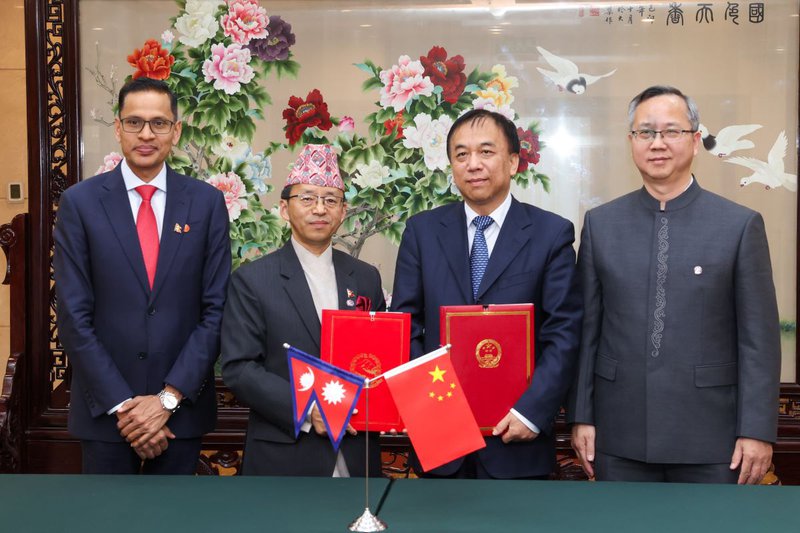
What is in the 'BRI Framework' signed by Nepal and China, what is the next process
Officials of Nepal and China on Wednesday signed the Chinese concept 'Belt and Road Initiative' (BRI) Cooperation Framework, which was taken as the main objective of Prime Minister KP Sharma Oli's visit to China.
Ambassador of Nepal to China Krishna Prasad Oli said that the signing was done between the officials of the two countries.
"The Broader Framework has been agreed upon, but I am not in a position to go into detail now," Ambassador Oli said in a brief interview with the BBC.
But Pradeep Gyawali, Deputy Secretary General of Prime Minister KP Sharma Oli's party UML, has mentioned on social media that which projects are included under the 'BRI Framework'.
According to him, these include Tokha-Chhare tunnel, Hilsa-Simikot road project, Kimathanga-Khandbari road and bridge, Geelong-Kerung-Kathmandu cross-border railway, Amargadhi City Hall at Dadeldhura, Geelong-Kerung-Rasuwagadhi Chilime 220 kV cross-border transmission line, Madan Bhandari University, Kathmandu Scientific Center and Science Museum, China-Nepal Industrial Friendship Park in Damak and Jhapa Sports and Athletics Complex.
The 'BRI' was signed between the officials of the two countries. It is said that the document seeks to define the 10 projects mentioned in the Cooperation Framework to be prioritized.
Advocate Semant Dahal, who gave legal advice to a group of power partner parties to reach an agreement on BRI before visiting China, said that it also included which one should be prioritized in such projects.
"About ten projects, it is written that we will analyze the investment, financial aspects, technical aspects and mainly whether the projects are feasible from an environmental point of view and whether the project will be 'value for money' or economically beneficial for Nepal," Dahal said.
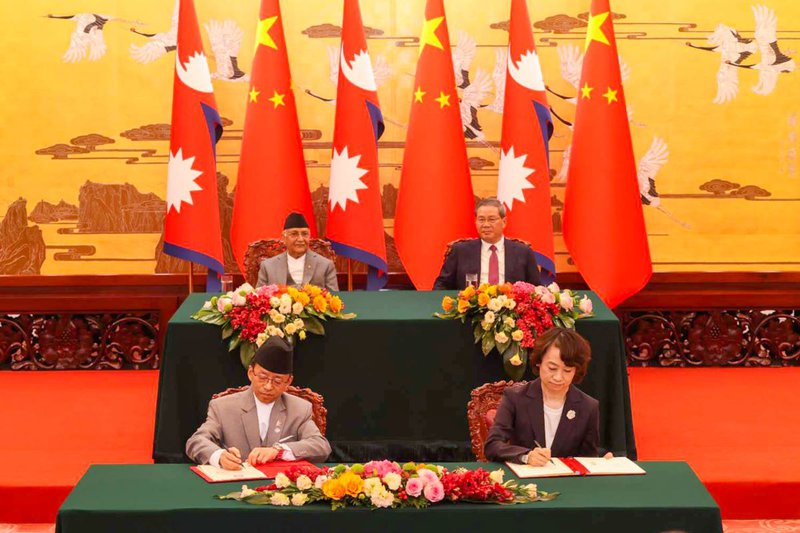
Before Prime Minister Oli's visit to China, the two power partner parties Nepali Congress and CPN-UML could not reach an agreement on the BRI implementation framework until the last minute.
Nepali Congress leaders have been saying that they cannot agree to take more loans from China.
After the two parties agreed on the same issue, it was said that a proposal was sent to China.
According to Advocate Dahal, when the BRI framework is applied to Nepal, it has been agreed between the two countries that the project will be carried forward under the 'Aid' framework.
Earlier, his party leaders and sources close to the Ministry of Foreign Affairs told the BBC that Prime Minister Oli's homework for a visit to China has started after he did not receive an invitation from India for 100 days after assuming power.
Technically, this is Oli's fourth term. In the previous second and third term, he led the power for about three and a half years from 2074 to 2079 by relying on two articles of the constitution, so it is considered as one term. Even at that time, he first visited India and later went to China.
- TEACHERS ON STRIKE: Students' Future In Jeopardy
- Apr 25, 2025
- NEPAL-THAILAND: Joint Business Council
- Apr 13, 2025
- BIMSTEC SUMMIT: Nepal’s Stand
- Apr 11, 2025
- IME GROUP: Expands Into Paper Industry
- Mar 24, 2025
- CPN UML: Instigated By India
- Mar 23, 2025














